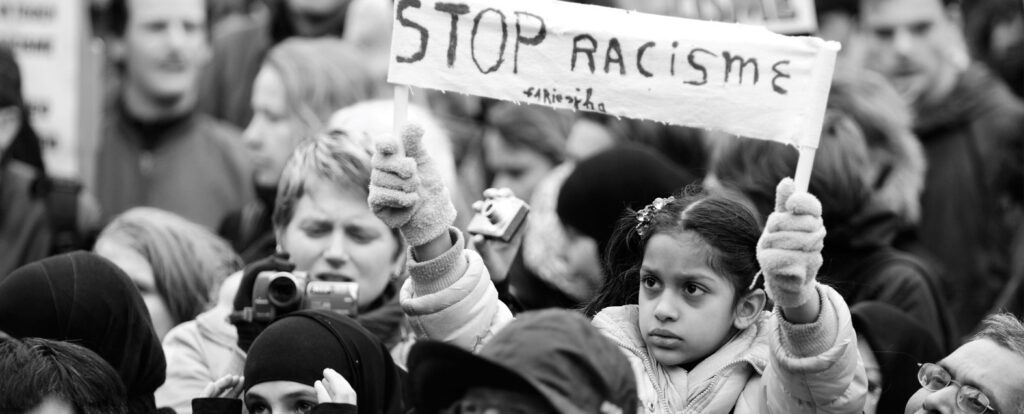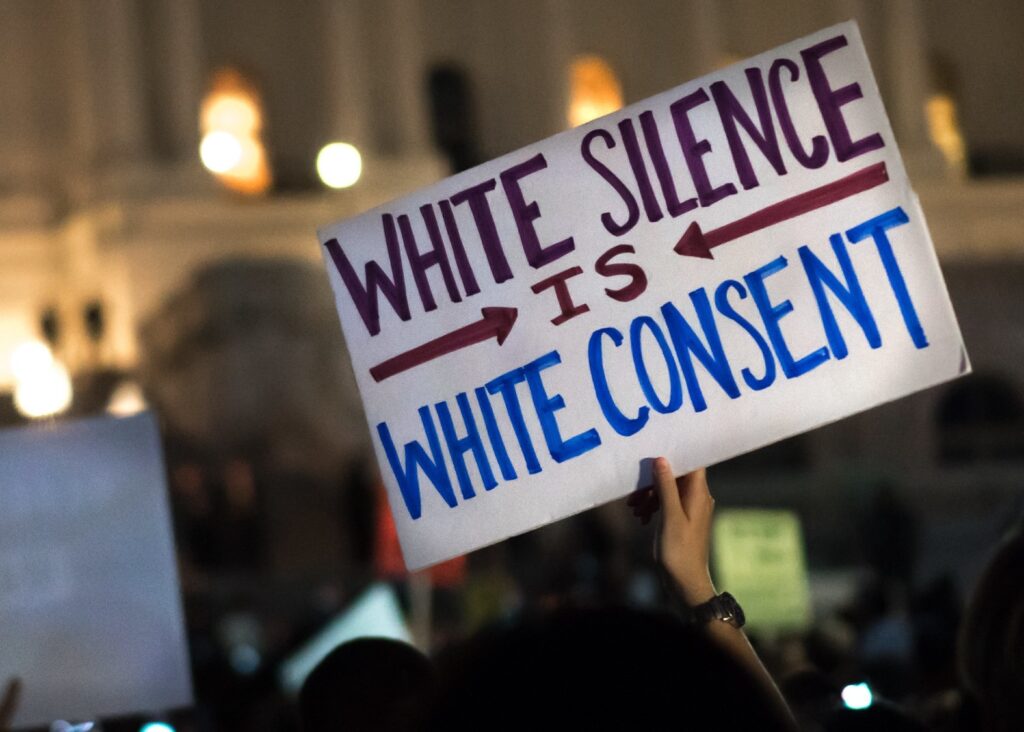Race-based silencing is a pervasive issue that has persisted throughout history and continues to undermine progress toward racial equality. It refers to the suppression of marginalised voices, ideas, and experiences based on a person’s racial or ethnic background. This form of silencing is rooted in systemic racism, discrimination, and prejudice, and it manifests itself in various ways, both subtle and overt. Understanding the concept of race-based silencing is essential in addressing and dismantling the structural inequalities that persist in society.
The history of race-based silencing is deeply intertwined with the legacy of colonialism, slavery, and segregation. Throughout history, minority voices were systematically silenced by those in power, who sought to maintain dominance and control. From the silencing of Native American voices during the colonisation of North America to the brutal suppression of African American voices during slavery and the Jim Crow era, examples of racial oppression abound.
Although significant progress has been made in the fight for civil rights, race-based silencing continues to plague our society. This insidious issue has evolved over time, taking on more subtle but equally harmful forms. In our modern context, the manifestations of race-based silencing are varied and deeply ingrained in our societal fabric.
One of the most prevalent forms of race-based silencing is the perpetuation of stereotypes based on race or ethnicity. These stereotypes not only perpetuate prejudice but also actively contribute to the silencing of individuals and communities. By reducing complex, diverse identities to simplistic and often negative generalisations, stereotypes undermine the richness of individual experiences. Those who are victims of these stereotypes often find their voices dismissed, and their unique perspectives overshadowed by preconceived notions.
Micro-aggressions represent another facet of race-based silencing. These are subtle, often unintentional, discriminatory remarks or actions directed at marginalised groups. These everyday acts of bias may seem small on their own, but they accumulate over time, having a profound impact on the ability of individuals to express themselves fully. Micro-aggressions can create an environment in which people are hesitant to voice their concerns or share their experiences, fearing that they won’t be taken seriously or will face further discrimination.
The lack of representation in media, politics, and other influential positions is a glaring issue contributing to race-based silencing. When racial and ethnic minorities are underrepresented in key institutions, it marginalises their voices and experiences. It sends a message that their perspectives and concerns are not as valid or important as those of the majority. This lack of representation reinforces feelings of invisibility and powerlessness among minority communities, making it difficult for their voices to be heard and their issues addressed.

A concept that has gained recognition in recent years is “white fragility.” This term describes the defensiveness and discomfort that some white individuals exhibit when confronted with discussions of race and racism. White fragility can stifle open dialogue, making it challenging for marginalised voices to be heard. When individuals feel threatened or uncomfortable discussing these issues, it hinders progress toward greater understanding and empathy, ultimately perpetuating race-based silencing.
In addressing race-based silencing, it’s essential to recognise that these manifestations are deeply interconnected and rooted in systemic racism. Overcoming them requires proactive measures that acknowledge their existence and actively work toward a more inclusive and equitable society. It involves promoting awareness, education, and fostering open dialogue. Additionally, allies can play a crucial role in dismantling race-based silencing by using their privilege to amplify marginalised voices and challenge discrimination.
Consequences of Race-Based Silencing
Race-based silencing inflicts profound consequences, not only on the silenced individuals and communities but also on society as a whole. These consequences ripple through the fabric of our collective existence, shaping attitudes, opportunities, and the very foundations of equality and justice.
Diminished Self-Esteem: One of the most palpable outcomes of race-based silencing is the erosion of an individual’s self-esteem and self-worth. Being consistently silenced and dismissed sends a clear message that one’s voice and experiences hold little value. This, in turn, fosters a sense of powerlessness and self-doubt. It is a disheartening journey toward the belief that one’s thoughts and emotions are inconsequential, stifling the development of a strong, self-assured identity.
Reinforced Inequality: The silencing of marginalised voices is a potent tool for perpetuating existing inequalities. By suppressing these voices, society limits the opportunities and resources available to communities that are already grappling with systemic disadvantages. Race-based silencing becomes an insidious force that further entrenches disparities in access to education, employment, healthcare, and political representation, deepening the chasm between the privileged and the marginalised.
Divisiveness: The suppression of racial and ethnic voices can have a divisive impact on society as a whole. When entire communities are systematically silenced, feelings of resentment and mistrust can fester. These divisions are often borne from a sense of injustice and the belief that their concerns and experiences are dismissed or ignored. It is a division that undermines social cohesion and stands as an obstacle to unity and solidarity.
Incomplete Understanding: The loss of marginalised voices due to race-based silencing is detrimental to society’s quest for a comprehensive and accurate understanding of the world and its complexities. When these voices are silenced, we miss out on invaluable perspectives and insights that contribute to a more nuanced and truthful comprehension of the issues that affect us all. Without the full range of experiences and perspectives, we are left with an incomplete tapestry, unable to grasp the intricate threads that form the fabric of society.

In addressing the consequences of race-based silencing, it is imperative to recognize that these outcomes are deeply interwoven with the broader structures of systemic racism and discrimination. To dismantle this pattern of silencing, it is essential to acknowledge its effects, promote awareness, and take active steps to create a more inclusive and equitable society. Only then can we hope to counteract the damage inflicted by diminished self-esteem, reinforced inequality, divisiveness, and the loss of a complete understanding of the world we inhabit. In this collective effort, we move closer to a more just and equitable society that values and empowers all voices, regardless of their racial or ethnic background.
Addressing Race-Based Silencing
To combat race-based silencing and its adverse consequences, society must adopt a comprehensive and proactive approach. This approach encompasses several key strategies:
Acknowledging the Issue: The first and crucial step in addressing race-based silencing is acknowledging its existence. Ignoring or denying the problem perpetuates the cycle of silencing and discrimination. Recognising the existence of race-based silencing is the foundation upon which meaningful change can be built.
Education and Awareness: Education on the history and impact of race-based silencing is of paramount importance. It’s not enough to acknowledge its existence; we must also understand the historical context and its pervasive effects. By promoting awareness and understanding, we empower individuals to recognise their own biases and prejudices, fostering a commitment to change.
Promoting Diversity and Inclusion: Encouraging diversity and inclusion is an essential aspect of dismantling race-based silencing. This means actively working to include individuals from all backgrounds in all aspects of society, from the workplace to educational institutions. By creating spaces that reflect the full breadth of human experiences, we amplify marginalised voices and challenge the status quo that silences them.
Open Dialogue: Establishing safe spaces for open and honest discussions about race, privilege, and discrimination is a vital step in dismantling race-based silencing. These dialogues help to break down the barriers to communication, enabling individuals to share their experiences and perspectives without fear of judgment or reprisal. Open dialogue is a bridge to greater understanding and empathy, fostering meaningful change.
Allyship: Allies, individuals who may not directly experience race-based silencing but are committed to supporting marginalised communities, play a vital role in dismantling these practices. Allies can use their privilege to amplify marginalised voices and challenge discrimination when they encounter it. By actively advocating for and supporting those who are silenced, allies contribute to a more equitable and inclusive society.
Ultimately, Race-based silencing is an enduring issue that impedes progress toward racial equality and justice. It has deep historical roots and continues to manifest itself in various forms in modern society. Addressing this problem requires recognising it, promoting awareness, and actively working to create a more inclusive and equitable society. By doing so, we can begin to break down the barriers that have silenced marginalised voices for far too long and work toward a more just and equal world. In our collective efforts to combat race-based silencing, we move closer to the realisation of a just and equitable society that values and uplifts all voices, regardless of their racial or ethnic background.
Sources
- https://link.springer.com/book/10.1057/9781137263223
- https://journals.sagepub.com/doi/pdf/10.1177/1742715020976003#:~:text=It%20can%20lead%20to%20collective,permits%20a%20festering%20of%20racism.
- https://journals.sagepub.com/doi/pdf/10.1177/0533316420908974
- https://www.sciencedirect.com/science/article/pii/S2667321523000525
- https://academic.oup.com/book/3531/chapter/144767814




